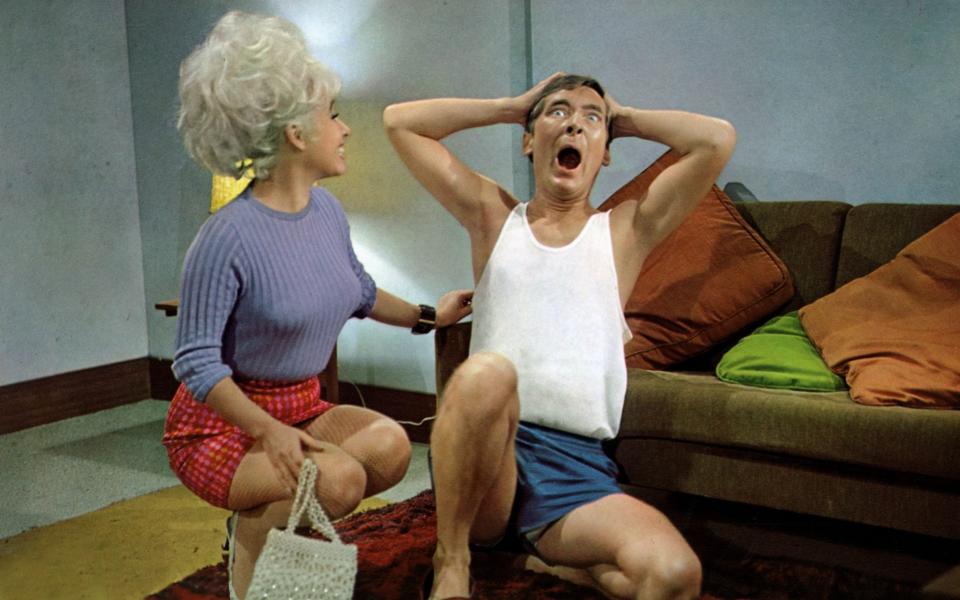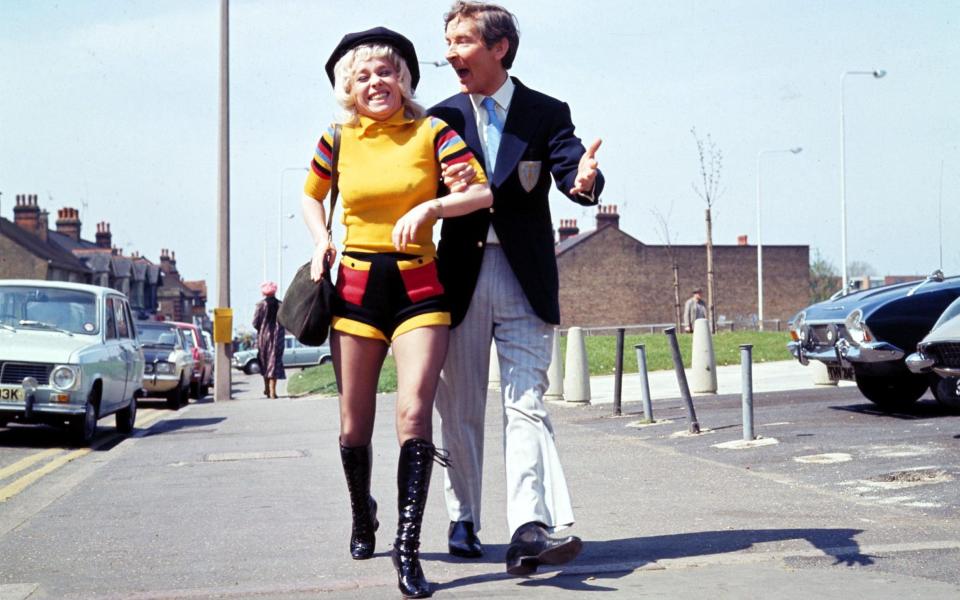'Could you marry me?': how Kenneth Williams fell for Barbara Windsor

It was no surprise that the first wave of obituaries for Dame Barbara Windsor, who died this week at 83 following a six-year struggle with Alzheimer’s, featured images of scenes she’d shared with Kenneth Williams. They went together like boiled beef and carrots, and were no less London-flavoured than Harry Champion’s song of that name. Williams could hide it well – most of us think of him first in his posh mode – but his birthplace in Barnsbury, Islington was a walkable distance from Barbara’s first address, in Shoreditch. Powerfully different personalities though they were, each saw something local and familiar in the other; an odd-couple friendship that would last 24 years until his death in 1988.
Kenneth noted their connection immediately in his 1964 diary – which I would go on to edit and publish 30 years later – after one day’s work on the set of Carry On Spying at Pinewood: “I must say I like this Barbara Windsor. She is a charming little girl.” But of course Kenny’s definition of charm could be unconventional. Told by the lady herself, the tale takes on a different emphasis, starting with the early warning Bernard Cribbins gave her that “Mr Williams” normally took against newcomers to the cast on principle. The fake-bearded Mr W confirmed this by ticking Miss Windsor off when she fluffed a line. “Don’t you have a go at me,” she notoriously replied, “with Fenella Fielding’s minge hair round yer chops. I won’t stand for it.” “Oww!” cried Kenny. “Ain’t she lovely?” He was indeed charmed.
That anecdote has been in unexpurgated print for more than twenty years, and was once retold live on BBC radio’s most distinguished late-night arts programme (I was there). It handsomely proves Dame Barbara’s lifelong talent for getting away with things. And there you have one of the reasons why Williams was so fascinated by her. Seeing him acting noisily among friends in a restaurant, you might have assumed his social life to be uninhibited, but we all know now that he was a recluse, his most daring physical encounters tentatively played out with young men in Morocco. With Barbara, everything was on display, especially sexual enjoyment. She said herself that once she’d found out that sex took place, she went ahead and did it – she thought everyone did. Her intimate affairs were possibly the least private of any celebrity’s, and her abortions almost badges of dauntlessness.
It might seem ludicrous, in view of all this, that Kenneth should have proposed marriage to Barbara, and in a quaint form: “Do you think if you ever left Ronnie Knight you could marry me?” She thought it “a lovely thing to say”, but the follow-up had killed any chances of it actually happening off: “‘Mind you,’ he said, ‘there’d be no sex.’ I said, ‘Bugger you, then,’” she recounted. With Kenneth, this was all part of a pattern: he proposed marriage to several theatrical ladies – Annette Kerr, Nora Stapleton and Joan Sims are three that come to mind – and always “for companionship’s sake”; but they all wisely declined his offer.
In the case of Windsor and Knight, Williams had participated at least symbolically in their marriage anyway, when he accompanied them on their Madeira honeymoon. It’s interesting that in late Victorian days, a honeymoon a trois was not all that uncommon among the well-to-do, but it usually involved a female friend of the bride’s, and not, as in this case, a male friend, plus his mother and half-sister. A poor hotel, and worse weather, didn’t help the mood, and the trip was the occasion of a rare falling-out between Kenneth and Barbara, when she started sermonising to Louie, Kenneth’s mother, about her son’s behaviour.

One subject that didn’t seem to come up on this disastrous jaunt was Ronnie Knight’s criminal past, but his criminal future eventually sent him abroad for ten years to shelter from British justice. Well before that, the Windsor marriage had been invaded on the quiet by a new candidate, Sidney James. (The cast of the Carry Ons can’t be accused of failing to live up to their series title.) The grizzled ogler was only “new” in the sense that Barbara finally accepted his advances after years of badgering, but at first, it seemed to pay off for both parties. He got what he wanted, and “I had a beautiful, beautiful present from Sid James,” she said, “a heart in jet with diamonds.” Sadly, that disappeared, along with a lot of other mementos and engagement rings, in a robbery at her north London home – part of the endless volatility of Barbara’s life.
Naturally, Kenneth’s opinion of Sid, who he considered a heterosexual lech, was already low, and sank further as evidence emerged of a continuing affair. Williams fumed privately, but preferred to pour his scorn over Sid’s performances rather than his morals. “Sid James looks like something that has been taken out of a pickling jar,” he wrote, “and that mirthless laugh he uses to cover the embarrassment of a laugh not received is sickening.” By contrast, Barbara’s amorousness seemed to delight Kenneth, as on the set of Carry On Dick. This time he told his diary: “Barbara Windsor said of the man with the horses ‘I’m mad about him! I’ve given my Ronnie grounds for divorce four times in five minutes just looking at him!’ She is immensely likeable and vulnerable and funny! Totally adorable. I can think of no actress I’d rather be with.” He showed he meant that professionally, too, when he directed Barbara in a Lyric Hammersmith production of Joe Orton’s Loot. And when he took over Terry Wogan’s chat show for a week, she was naturally invited to talk about her latest honeymoon – and the one they had previously endured together.
The respective street-lives of these two characters tell their story. Kenneth Williams lived out his whole existence within an easy stroll of BBC Broadcasting House, his most reliable source of income (since the Carry Ons paid much in fame, but only £5,000 a time in cash.) His self-absorbed demeanour discouraged random meetings, which suited him; walking in the street with Barbara was the most extreme kind of contrast which I experienced myself, when a BBC producer and I accompanied her on a tour of Mayfair and Soho in 2012. There she commented on the sites of all the clubs which put on little revues, the means by which she first moved her reputation from the East End to the West End.

The reaction was astonishing – rather like a royal walkabout. Wherever we made the mistake of stopping, a crowd gathered. Primitive selfies were obtained, autograph books produced or improvised, questions and congratulations launched upon the air. Barbara fielded it all cheerfully, until the moment came when she realised enough time had passed. Then the boom came down, authority had spoken, and we moved on amicably to the next location. It was a remarkable thing to see. The whole process should have lasted an hour, and took about three.
The final meeting between Barbara and Kenneth also occurred on the street. She talked about it, with some difficulty, on the South Bank Show six years after his death. “To be truthful, darlin’, you don’t look so great,” she told him. And then the mumbled reply: “‘I feel awful, terrib... but that’s the ulcer. Got to go now, have the operation, have the surgery.’ And you know, he looked so sad. So very, very sad. And I remember walking away with big tears in my eyes...” Twenty years on from that interview, she unveiled a blue plaque outside Kenneth’s address in Farley Court, Allsop Place, NW1. That was 2014, the year Dame Barbara Windsor was first diagnosed with Alzheimer’s Disease, and that great little engine began to misfire and fail. And now falls silent.
The Kenneth Williams Diaries, edited by Russell Davies, are available for £16.99 plus p&p. To order a copy call 0844 871 1514 or visit books.telegraph.co.uk

 Yahoo Movies
Yahoo Movies 
